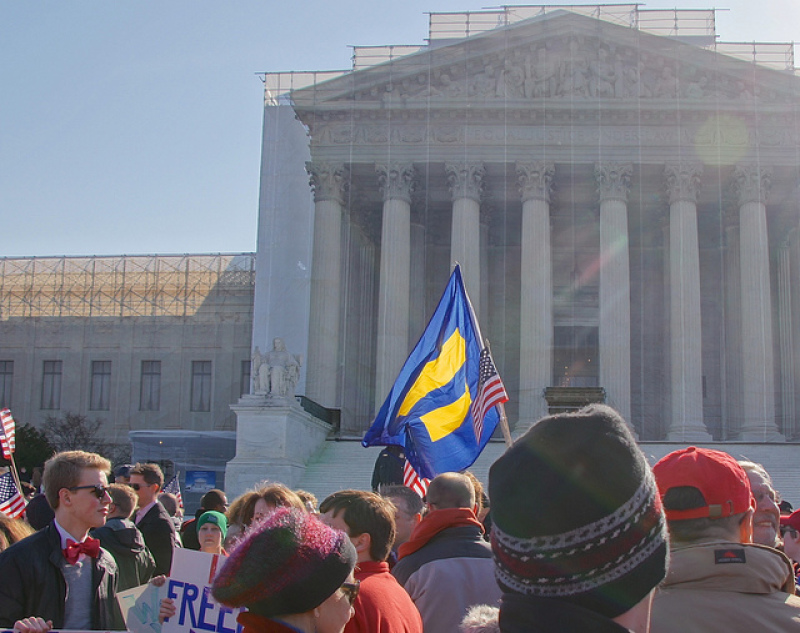
On June 26, 2015 the United States Supreme Court in a 5-4 decision ruled that the Constitution requires that same-sex couples be allowed to marry no matter where they live and that states may no longer reserve the right only for heterosexual couples. The Supreme Court ruled gay couples nationwide have a right to marry.
The right to marry is a question of the government performing marriages. The question everyone is asking is how does the U.S. Supreme Court decision effect religious institutions performing marriages, which for the most part are against same sex marriage. Most people are in agreement that the First Amendment of the U.S. Constitution that provides for freedom of religion protects clergy from being required to officiate at marriages for same-sex couples and churches from being forced to allow gay and lesbian couples to marry in their sanctuaries. For example, pastors will often not marry a believer to an unbeliever, or conduct marriages between two people of different faiths, and many will not perform ceremonies for someone they know didn't have biblical grounds for a previous divorce. Nothing in the Supreme Court's opinion changes the freedom of pastors, ministers, rabbis and the like to continue to make those theologically based decisions about whom they will marry.
The problem is that some states, like California, have non-discrimination laws against discrimination based on sex. So what about a church basement or retreat center, which is rented out for opposite-sex weddings? And what about a religiously affiliated institution, like a university, that offers married heterosexual students housing but refuses such accommodation for married gay and lesbian students? These questions have wide spread implications, since virtually all U.S. based religious groups have affiliated nonprofits (such as schools, hospitals and charities). Many, including some evangelical Protestant denominations, the Catholic Church, the Mormon church, Orthodox Jewish groups, Islam, oppose gay marriage on religious grounds.
Based on the U.S. Supreme Court case on same sex marriage, it may be wise for religios institutions to maintain a clear statement of faith about marriage, human sexuality and gender. Religious institutions should update their statement of faith to include the congregation's belief on these issues. Doing it in the wake of the Supreme Court decision may be helpful if a legal issue ever arises. Putting clarifying language in the statement of faith merely serves to codify a church's long-standing religious beliefs under the First Amendment to the United States Constitution regarding freedom of religion. The key point is to tie usage of the church's facility to the statement of faith and religious beliefs of the church; and then to make clear that uses inconsistent with those religious beliefs will not be allowed. This is at least a starting point for religious entities if a case arises in the near future.
The First Amendment of the U.S. Constitution sets forth free exercise and establishment clause, freedom of speech and freedom of association when it comes to religion, which has developed the Ministerial Exception (government won't interfere with religious internal matters, including hiring and firing of pastors, unless due process has been violated), and the Church Autonomy Doctrine (which means that courts lack jurisdiction to resolve disputes that are strictly and purely ecclesiastical in nature). Exceptions to the church autonomy doctrine include fraud or collusion, property disputes resolved by neutral principles of law, and advancing compelling government interests. While small, there is a possibility that the third exception, advancing compelling government interests, could be used as an argument for requiring churches to at least host same-sex marriages, such as under public accommodation laws. Notwithstanding minimal concern over possible exceptions for advancing compelling government interests, the church autonomy doctrine will be strongly protective of religious leaders from being forced to perform same-sex marriages.
In addition, the Religious Freedom Restoration Act ("RFRA") prevents the federal government from substantially burdening a person's exercise of religion through even a generally applicable law or regulation, unless the government can show it is furthering a compelling government interest through the least restrictive means. The RFRA is a law to protect churches' and pastors' free exercise of religion, which would include protection from being forced to perform same-sex marriages. Certain States have also enacted such laws, but California has not.
It will be interesting to see how the law develops in this area, whether by case law and/or states enactment of laws regarding religion, and where the line is drawn between religious freedom and non-discrimination laws.
David T. Marh currently works as a corporate and international attorney at Marh & Associates. He has handled corporate securities, complex agreements and commercial transactions both domestically and internationally. Mr. Marh is also the chairman of Good Neighbors, USA, and received his B.A. and M.B.A. from the University of California, Irvine and his J.D. from Western State University in Fullerton, CA. Marh has been married for 26 years, and has two sons, Daniel (25) and John (21).



















